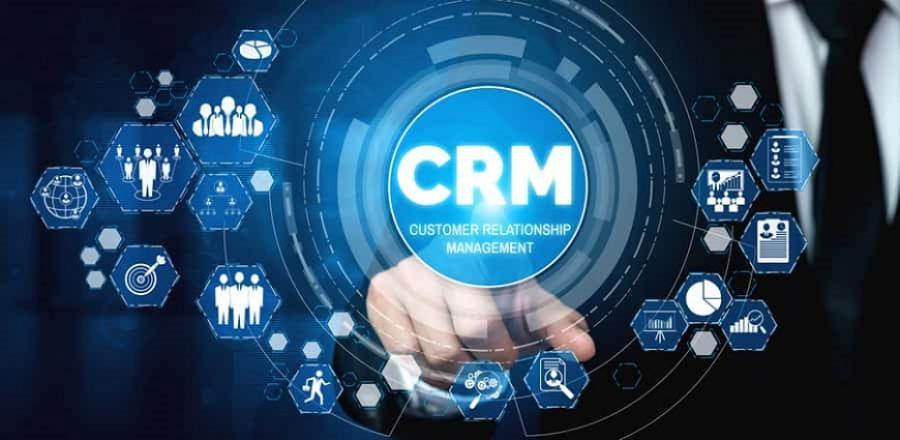Customer relationship management is used to describe the way the business communicates with customers. Many of us think of such a system as the database that contains the purchaser's information.
Still, it is just a part of the complete business process as it involves using technology and information to search and target buyers, get leads, offer messages and solutions to existing clients and handle after-sale activities.
The building blocks of such a system are - the database, the technological support, and the strategy used by the management to enhance services to meet client's requirements, identify potential buyers, and get reports to see if the strategy adopted by the sales and marketing team is working.

What is CRM?
It refers to the business approach that can integrate people, technology, and processes to maximize the relations of anorganization with different types of clientele.
It involves acquiring and developing knowledge about the buyers and using this information on different touchpoints to balancerevenue and profits with maximum purchaser satisfaction.
The modern CRMs are based on multiple geographical locations, multiple devices, and people from completely different backgrounds.
A firm must use the technology to show how the firm cares about the needs, concerns, andqueries of the purchasers. It provides basic technical support for enhancing marketing towards the most profitable trade, which helps improve the bottom line and efficiency by providing support and services to customers online.
-
It helps to anticipate future business requirements based on historical sales and service trends.
-
It can increase the client base to help Develop new ways to engage in business online.
-
Such a system can deliver services or products most suitable for buyers' specific requirements, making them appreciate the service.
-
It also helps deliver superior services and products to meet customers' needs.

How does CRM work?
It helps to provide methods to track communication channels and Develop a productive tool to increase the reach of sales efforts where the strategies are based on a centralized system of management of quotes and contracts.
It generates leads through multiple customer interaction points, enabling a higher conversion rate by prioritizing leads based on AI. It plays an important role in generating highly qualified leads. It is useful during follow-ups and can support in getting closure.
The sales team can use methods for user-account management through automated communication emails/messages based on shopper/prospect account transactions.
-
It can be used for automated workflow and loyalty management, where the firm sends greetings to shoppers on their birthdays or provides customized offers on their special days. Such actions can help to build a strong buyer relationship.
-
It provides a means to facilitate effective consumer servicing by making all the relevant data related to the key consumers available.
-
It helps to manage consumer segmentation exercises, and with a host of filters, it helps buyers make informed decisions.
What does a CRM system do?
-
It helps to plan promotional campaigns where one can set customized settings, and an automated system can be used to manage campaigns and promotions.
-
It helps to keep track of profiles of existing clientele. Based on past sales success and other metrics, it becomes easy to define strategies for the future.
-
It allows the creation of various reports and dashboards to help make decisions.
-
It provides features to personalize relationships with the shopper.

What are the examples of CRM?
Some popular CRM software are Salesforce.com, Microsoft Dynamics 365, Pipedrive, Insightly, Freshsales, and others.
The strategy and software a firm adopts should be able to access the company's capabilities tosee if there is adequate support of technology, human resources, and skills to achieve the desired goals.
For a successful strategy -
The firm's vision, consumer experience, organizational collaboration, strategy, processes,metrics, and technology should be determined strategically.
The management should be able to identify the steps required to achieve the vision and monitor progress towards the goals.
The firm should be able to incorporate the tool/ technology into the entire business model and align it with marketing and sales teams.

What Does CRM Stand For in a Business?
It stands for Customer Relationship Management and can be used to build value by maximizing
repeat business opportunities by anticipating the existing purchasers.
It can identify potential patrons, complementary products, and target marketing campaigns.
It helps to build value for a consumer where one can order and buy through pre-filled order forms and
email reminders.
-
It provides data and reports that can be immediately created, and such information can be shared with others. It can get customer responses and feedback through social media channels like Twitter.
-
It provides an online forum where buyers can give reviews and feedback. It allows the seller to hear about problems and respond quickly.
-
Such strategies allow for setting a direction for CRM system initiatives and ensuring the investments are targeted to foster better buyer relations.

What does CRM stand for in sales?
The firm identifies the customer's profile, requirements, and satisfaction level in sales. It compares the data and determines the impact of sales efforts on the buyers' purchasing decisions.
Technology-enabled sales (TES) helps improve sales to partners on the Internet, and the opportunity management system (OMS) provides the framework for such application solutions. Such systems provide tools for enhancing business planning, forecasting, and the account management system.
Such systems are vital for multichannel TES, enabling B2B selling across field, inside, and external sales.

What does CRM stand for in marketing?
Technology-enabled marketing (TEM) is the platform where the team gathers information andautomates the shopper relationship cycle that involves the process of retention, acquisition, andextension.
TEM requires a proactive strategy for using IT features in their marketing efforts through data management, analysis, mining, and reporting tools.
It is a broad term widely implemented for managing consumer interactions that involves using technology to organize, synchronize, automate, and conduct marketing activities.
The overall goal is to find, attract, and get new shoppers, nurture and retain the buyers alreadywith the firm, and reduce the cost of marketing and client services.
The system should be designed and supported to improve human interactions to promote operational and transactional approaches for end-user management, focused on departments like sales, marketing, and other services.
The application provides automated support for modification, culture change, and use of data to meet the business value of corporate objectives like an increase in revenue, increase in selling time, higher margins, campaign effectiveness, reduction in cell queuing time, etc.

Why is CRM so important to businesses?
It provides a service for retaining and extending shopper relationships once a product or service is sold.
It can be used as a front-office system with back-end links to support a customer-centric environment.
It can be used to manage the relationship with external and internal end-users.
It helps execute long-term planning and synchronize market dynamics and resource commitments.
It helps provide insight, increase purchaser access, and provide better interactions with buyers and integration throughout the clientele channels with back-office enterprise functions.
It is the business strategy that fosters shopper-satisfying behaviour and implements customer-centric processes.

What does CRM stand for in healthcare?
In the healthcare industry, the value of health education is reduced by delays caused by the doctors in providing care, mostly when the doctors fail to get proper records on time about the patient. Poor communication and inadequate queries can create misunderstandings and lead to poor judgment. The value of service can be affected by the poor schedule of the physician.
Traditional medical care systems are about long waitlists or queues of patients waiting for the physician's consultation that need to conduct or re-conduct the lab tests, which have been conducted previously to deliver appropriate care.
The patient must carry the last medical consumption, previous diagnosis records, lab test results, activities suggested by previous caretakers, and other details.
Such activities delay action. True business transformation can be achieved by implementing automated systems to help re-engineer such places' cultures, processes, and environments.

In healthcare systems, pharmaceutical companies and care delivery organizations like hospitals, physicians and other medical groups get proper knowledge and unconventional vendor solutions, which can provide substantial user benefits.
Many pharmaceutical firms buy a CRM system as they offer a complete package with sales, marketing, and customer service capabilities.
Many firms are migrating from intranet to Internet or cloud-based health care solutions to reduce IT, sales, and marketing costs.
The new generation of self-service, personalized systems with traditional methods helps move from complex, outdated systems and database architecture to modern, timely mechanisms.
There are many benefits of such systems -
-
Technology helps to keep, manage and gain databases that can provide accurate details about the medical history of any patient in any part of the world, and this helps to give highly managed care in a competitive market.
-
The healthcare unit or pharmaceutical firms can design portals as communication channels to manage interactions between physicians, hospitals, patients, and other healthcare providers to increase customer loyalty, lower costs, and increase market share.
-
It can supply visitors with specific healthcare information, services, and benefits like online prescription orders, health risk assessments, chat rooms, and the ability to communicate with physicians.
-
Pharmaceutical firms benefit by providing methods to compare customer behaviour patterns and get proper insight to deliver personalized or outbound marketing. Many marketing firms create real, measurable sales opportunities using such solutions.
-
Word-of-mouth marketing to sponsored programs or chat rooms can become more effective if the patients get a good experience at the health care unit that can be enhanced by implementing an email response system, interactive voice response IVR or call through service, collaboration, and others.
-
Marketing techniques can be applied where the clinical and psycho-socio characteristics of the patient can be determined to deploy collaborative medical management.
-
A specialized one-to-one care delivery system can be provided using a CRM system that is highly competitive where the doctors can look into the patient's record anywhere on the Internet and can provide effective health care without waiting to get medical history records.
-
The doctors can recommend the patient the best cure based on the online recommendations made by an expert practitioner.

What does CRM stand for in real estate?
Several real estate firms require technical support to help manage promotions and marketing campaigns.
In terms of customer management, the key challenges faced by the real estate developers are -
-
The buyer has multiple options to choose from where the buyer may opt for properties that can provide additional value. Hence, the sellers should aim to use value selling instead of the commodity selling approach.
-
Each offer has a unique property in terms of location, pricing, post-sales services, price, and other benefits or drawbacks. It can be challenging for the developer to reach the right kind of buyer or target the prospective buyer based on specific criteria like geographical location or kind of offer like a commercial, residential, hotel, shop, etc.
-
To enhance the lead-to-conversion ratio, the seller must have a healthy set of leads in the sales funnel. Conducting effective lead-generation campaigns can increase the chance of a sale.
-
Every real estate developer manages the number of projects and leads for each project effectively and analyzes the offers scientifically to find cross or up-selling opportunities.

The seller may find it difficult to get a positive response even after many stages of showing and bargaining, and they need to get several interactions with the developers and keep a record of the various interactions and outcomes to take appropriate action to get higher ROI.
Enterprises no longer find a customer as a homogeneous collection of revenue-generating opportunities. Nowadays, financial companies focus on loyalty and retention, and they need to calculate the customer satisfaction index to analyze the marketing team's performance along with technical quality, efficiency, and functional effectiveness.
CRM system projects can be integrated and leveraged into all outward-facing actions to attain new buyers, retain the existing purchasers and identify profitable prospects where one knows that managing relationships from the initial contact to after-sale stage follow-ups helps increase the chance of keeping the shopper satisfied.
If a business unit fails to achieve its strategic objectives, it requires re-engineering the activities to fit into the new solution scheme.












